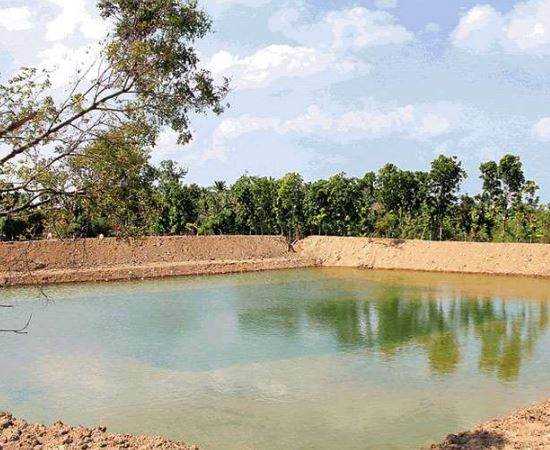
05-Jun-2020
World Enviroment Day : Nature Has It's Own Way
Late this time, the heat of the past week has shown widespread impact across the country. Although the temperature in north India is somewhat below normal today due to many geographical reasons, the mercury reached 47 degrees just a week ago.
At the same time, due to the situation arising from Corona, the population in the regional areas has increased due to the people who have returned to the village. With the sudden increase in the number of people, the demand for water is increasing in agriculture for the production of food grains besides daily work. In such adverse circumstances, if the MNREGA and the people returned from the cities are used properly, then the idea of a better life in the village can be realized.
It is noteworthy that lack of water is the root cause of migration in Bundelkhand. There are districts like Tikamgarh, where there are a thousand ponds, but sixty percent of the population migrates craving every drop of water. Actually, freeing people from dependence on government for their needs like water and habits of bashing nature is not a difficult task. Even today, there are people in villages who rely more on indigenous knowledge of their ancestors than on degree-based knowledge.
If the knowledge of these people and the hard work of the common people gets tempered by the government budget, then by sacrificing dried pools, rivers and drains, you can make a successful sacrifice for the relief of water crisis.
The budget for cleaning of traditional water resources can be easily taken from MNREGA. In fact, the task of cleaning the ponds and providing them with sufficient depth is not very expensive, nor does it require heavy machines. Silt filled with ponds stems from rotting leaves and other waste materials over the years, which are excellent fertilizers.
The farmers have come to know how much chemical fertilizers have destroyed the land and now their attitude is towards compost and other natural fertilizers. If the farmers are entrusted with the task of digging this manure, then they are happy. In Karnataka, with the help of the society, 50 such ponds have been rejuvenated, in which the transportation of silt was free. That is, the hauler earned money by selling this precious manure. Due to this, their fields get fertilizer, as well as irrigation facilities, are also increased by the maintenance of ponds.
If there is only mutual understanding, understanding and a keen sense of conservation of the ponds, neither silt will be saved in the ponds nor there will be a problem of bribery in the government staff.
READ HERE MORE : We Need Research Power To Tackle COVID-19
There have been many such instances across the country in the past when some of the local enthusiastic youths dug the rivers in such a way that now they have water all year round. The society struggling with water crisis has done countless experiments like connecting the river to the pond, filling the pond with deep wells, making drains on the mountain and raising their water in the pond and conquering the wrath of nature.
It is imperative that people leave their dependence on the government and leave their homes, in the heat of summer, to remove silt, deepening and repairing of traditional water resources of ponds, bawis, wells etc. The fields where this silt will reach will spill gold. Just one thing has to be taken care of to avoid the use of heavy machines in the deepening of traditional water bodies.
Consider the story of Andhiyara Talab in Chhatarpur district of Madhya Pradesh. Some two decades ago, the work of deepening the pond was started under drought relief.
Engineer-in-law had done a lot of deep digging in the middle of the pond. When the Indra gods were kind to the pond, the pond was filled to a night, but what? The next morning he was looking underfoot. In fact, without knowing the geographical conditions, the excavation of the pond broke in the excavation, which was directly related to the granite land structure of the area. Water came and swept away.
It is important to know here that till a century ago, the people of Dhemar society traditionally used to take care of these ponds of Bundelkhand. They used to keep the pond clean, save its canal, dam, water inward and in return, they would have the right to the fish, water chestnut and dakshina received from the society.
Similarly, a section of the society had taken up the task of saving the ponds in each area and its livelihood was managed by the same society which used the water of the pond. Ponds are an integral part of folk culture and civilization and cannot be left behind by government babus.
One positive effect of the lockdown has been revealed during this period that the environment has undergone extensive improvement. Meanwhile, a large population from cities and metros across the country has returned to the villages, which has faced the challenge of providing adequate livelihood with adequate resources to live.
In addition to cleaning the water resources, returning them to the old form can not only create extensive employment, but it will also improve the condition of the environment.

Content Writer/Journalist
I am a content writter !
Join Our Newsletter
Subscribe to our newsletter to receive emails about new views posts, releases and updates.
Copyright 2010 - 2026 MindStick Software Pvt. Ltd. All Rights Reserved Privacy Policy | Terms & Conditions | Cookie Policy